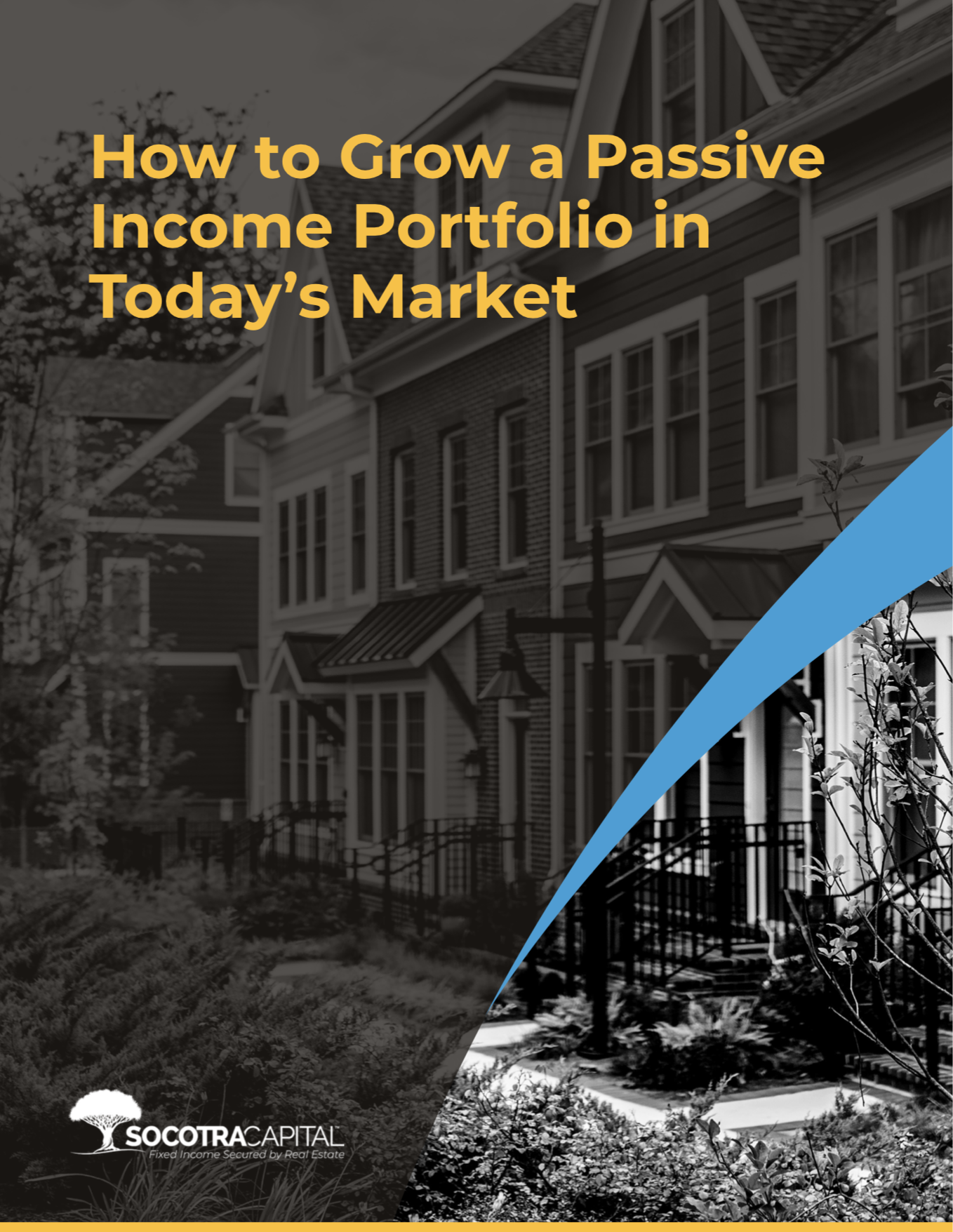How to Grow a Passive Income Portfolio
In Today's Market

Introduction
One of the best ways to grow your income is to work smarter, not harder. Whether you are planning for retirement or simply want to grow your income, generating passive income through real estate investments is a smart approach.
For many people, the biggest challenge is taking the first step to purchase their first investment property. When you understand the benefits of generating passive income and your options for making the initial investment, taking that first step feels less daunting.
If you are exploring the possibility of bringing in passive income by investing in real estate, this guide will help you learn more about how to find the right deal, how to finance it, and how to overcome some of the most common challenges.
Download a PDF version of this guide by filling out this form, or keep scrolling to read.

Chapter 1
Chapter 2
Chapter 3
Chapter 4
Chapter 5
Chapter 6

Chapter 1
What is Passive Income?
Passive income in the real estate industry is income that is derived from an investment to produce cash flow. This might include purchasing and maintaining investment properties such as:
- Single-family residential rental properties
- Multifamily residential rental properties
- Commercial rental properties
Cash flow comes from the monthly rent paid by tenants, and profit comes from having rents high enough to cover the mortgage and associated operating expenses. Getting the right deal is essential for generating profitable passive income and ensuring you're protected through market swings.

Chapter 2
Why is Passive Income Desirable?
Although many people take pleasure in working, there are only so many hours in a day. Having a passive source of revenue allows you to increase your income without dramatically increasing your time investment. You want to optimize your time and your capital.
You can improve your lifestyle.
With enough passive income from real estate investments, you can sustain your day-to-day living. By building income streams that don’t require you to do anything after the initial time investment, the profits are deposited monthly into your bank. This can potentially allow you to do the things that you want to do in your life, including:
- Going from full-time to part-time work
- Changing careers
- Starting a business based on your passion
- Supporting different stages of your life
The financial independence, retire early (FIRE) movement is catching on, and for many people, this means aggressive investing and saving so they can enjoy the fruits of their labor for longer. Generating passive income makes this approach even more sustainable in the long run.
Real estate is a smart investment.
Real estate historically appreciates in the long run, so it is widely seen as a smart investment. Real estate is also a great way to diversify your portfolio because the cash flow from investment properties isn’t usually correlated with what is going on in the stock market. Passive income also grows over time due to inflation. Increasing property values usually correlates with increases in passive income because rents will typically increase.
Additionally, if you’re good at and smart about real estate investing, the rates of return can be very attractive, and you can generate enough passive income to cover your expenses which gives you the flexibility to work or not work a traditional job.

Chapter 3
How Do You Build Passive Income?
Every investor does it a little differently, but there are some best practices to keep in mind when you start down the path to building a passive income.
Be smart about the deal.
This is the most challenging aspect of creating passive income. Finding the right property to buy at the right price point comes down to doing the research. If you're just starting and don't have a lot of capital, you might want to search for properties in less expensive neighborhoods. Understanding the costs is also essential, so run a lot of spreadsheets with different scenarios, especially if you have limited experience. Understand that you'll need a 20-40 percent down payment based on the scenario and budget accordingly. This might mean buying a property in a smaller town with lower prices. Filter your search by price, and look at the rental market in the area to make sure rents cover your mortgage.
Be connected.
Join local real estate clubs and make it known what you’re looking for. Building connections can help you avoid bidding wars because people will bring deals directly to you. Knowing potential tenants and what kind of space they might need also helps in knowing what type of demand is out there. Local professionals also know where the deals are and may be willing to share a few secrets with you.
Be specific.
Tell people what you are actively looking for, including the property type, price range, location, and any other details. The more people know about exactly what you are looking for, the more likely you are to find the right deal for your situation. The best deals often come from friends and family.
Be prepared.
You need to act quickly when a deal comes your way. Build relationships with brokers, lenders, contractors, and any other people you might need to help you make quick decisions.
Be disciplined.
Always be actively looking for properties that fit your criteria. Stay within your price range and limit your location search, so you’re not tempted to go outside your predefined limits. It’s also important not to get too attached to a deal because that could lead to poor decisions.
Be mindful of the location.
The farther you get away from your home base, the more difficult it is to manage a property. If your goal is to generate passive income with a manageable time investment, the location of the property is important. If you can't be near the property, it helps to have friends or family close by. Research and pick a location that you feel comfortable with.
Be aware of market trends.
The real estate market is impossible to accurately predict, but there are some trends that are likely to influence it. For example, with an upcoming surge of baby boomers relocating, you can expect a shift in available housing inventory in the coming years.
Be visionary.
Think about how a property can be improved and look beyond the surface-level issues. For example, a family that is selling a property owned by a hoarder might be willing to make a deal because they don’t want to handle cleaning it out. If you’re willing to take on (or pay for) that initial effort, it could mean decades of passive income from the investment.
"To find residential properties, look for homes in desirable areas that need cosmetic improvements but don’t have major structural issues. If you’re interested in investing in commercial properties such as retail, office, mixed-use, and smaller apartment buildings, look for distressed properties in locations near key traffic arteries.

Chapter 4
How Do You Fund Investment Properties?
Unless you get a windfall of cash, you will most likely have to secure financing for your first investment property. You have a few options:
Take out a traditional loan.
Conventional bank loans have a lot of benefits—they typically have lower rates and are widely available—but they are not always the right fit for investment properties. First of all, not all properties qualify for this type of loan, especially in the commercial realm, so it might not be an option at all. It can also be difficult to get this type of loan if you have nontraditional income streams or bad credit. Most importantly, conventional loans take at least 30 days to close. If you’re competing to purchase a property, a 30 day offer will likely get declined.
Receive an investment from friends and family.
Many people start their real estate investment activities with money from friends or family. This can be a good starting point for the first-time investor—assuming your network has the capital to contribute and the willingness to do it. This approach can also be a good way to raise money for a down payment on a hard money loan, which limits the amount owed to personal connections. You could start an investment fund with like-minded family and friends as well.
Remember speed is essential.
No matter which route you choose, time is of the essence because you must jump on hot opportunities when they arise. Competition can be fierce with cash offers and bidding wars, which is why hard money loans are a great choice for real estate investors.
.jpg?width=2121&height=1414&name=GettyImages-1075993466%20(1).jpg)
Chapter 5
What Are The Challenges Related to Passive Income?
Although it ultimately requires less work, generating a passive income does come with some effort and a certain amount of risk. Understanding the most common challenges can help you prepare to overcome them.
Buy right.
The hardest part is always the purchase. Do the math before you buy to ensure you will have positive cash flow. In general, maintenance for residential rentals is attractive because costs are low, so this is a great starting point for a first-time investor. If you are considering purchasing commercial properties, do a lot of research because the costs can quickly get out of hand if you are inexperienced.
Control costs.
Understand both the short-term costs to close the deal and the long-term costs to maintain the property. Consider what improvements need to be made before you buy and add a buffer for unexpected expenses. Again, maintenance costs are typically lower and more predictable for residential properties, so consider this path if you are just getting started.
Maintain profitability.
The main challenge around staying profitable is buying the property at a good entry point and being able to keep it leased without continuously putting more and more money into it. One of the best ways to do this is to keep good tenants who make timely payments. When first renting out a property, take the time to check references for potential tenants. When you get a good tenant, keep them for as long as possible.
.jpg?width=2121&height=1414&name=GettyImages-1181541530%20(1).jpg)
Chapter 6
How Do You Grow Passive Income?
Socotra Capital is on your side.
At Socotra Capital, we want to see you succeed with real estate investment. When we evaluate a loan application, we look at the property and its potential, not your credit history. Our goal is to help you close fast so you can capitalize on a hot opportunity when it comes your way. It all starts with an easy online application. We'll walk you through the process and give you same-day quotes. Get started today!
Forward this on to a friend
Know someone who might be interested in what you just learned? Fill out the form below to get a copy you can share.








.jpg?width=2000&name=GettyImages-1273390570%20(1).jpg)
